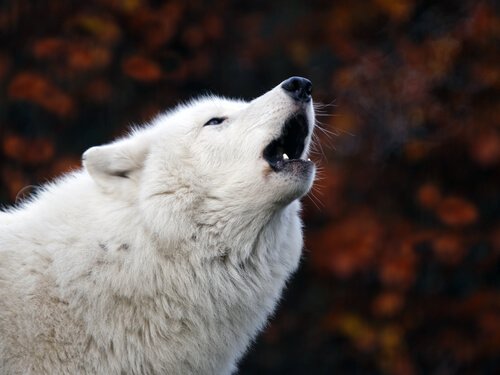Why Do Dogs Howl?

Have you ever wondered why dogs howl? Well, it’s mainly because of their wolfish heritage, and there are many reasons for it. It’s just one of the ways that canines use to communicate with other members of their species.
However, before trying to explain why dogs sometimes howl, let’s make something clear: under no circumstances does howling imply a bad omen.
So, now that we’ve discarded this myth, let us then explain the different reasons dogs have been expressing themselves through howling since forever. Then you’ll be able to understand your pet better and know how to act accordingly when they howl, if necessary.
As we said above, howling is one of the many forms of communication dogs use. Here are the reasons why dogs sometimes howl.
Why dogs howl: loneliness and anxiety

Wolves howl, for example, when they’re left on their own in the den waiting for the pack to return from hunting. They do so with the aim of bringing back their pack.
If we translate this behavior to a domestic dog, then we can say a dog will howl – and bark and yelp – if they’re alone at home anxiously awaiting the return of their human family.
Howls – and other things such as destroying objects or doing their business everywhere – can get out of control if the dog has separation anxiety. In this case, it would be good to consult a specialist in animal behavior.
There’s also the unfortunate and extreme case of animals who spend a big part of their day, or their life, tied and/or locked away. It’s quite understandable for an abused dog to howl under such circumstances.
A chorus of howls
The acute sense of hearing that dogs have is well-known. This is why, when we believe they’re howling for no apparent reason, they’re in fact responding to some very distant sounds your human ear cannot perceive.
It’s also very likely that your dog may be howling because they’re imitating others. There are certain sounds that can incite all dogs in a neighborhood in some way. This is particularly noticeable when they begin to howl as a siren goes by in the middle of the night.
Their “concert” will take place regardless of whether the siren belongs to an ambulance, a fire truck, a police car or any other form of alarm. Another thing that will lead to howling from your furry pal is the sound of certain music styles or sounds you make that your dog considers similar to theirs.
Dogs also howl to get your attention
Hunting dogs often howl when they detect prey and they do so to get the attention of their owners. In the same way, your pet can use it to try to capture your interest.
However, let’s be clear on this too, dogs inherited howling from their wolf ancestors. However, the art of manipulation they learned from us.
It’s quite likely that your furry friend will ask for your presence using this method so that then you can play with them and pamper them for a while. Whatever you do, pay attention to other signs the dog might be giving you.
If howling persists or becomes sorrowful, it may mean your animal is in pain for whatever reason. If you encounter this situation then take it to your vet as soon as possible. That way they can try and determine the source of the dog’s discomfort.
Other reasons why dogs may howl

Even though barking is the most common form dogs choose to communicate, they may also howl to:
- Mark their territory.
- Alert you of the presence of intruders. Especially about their mortal enemies who leave papers in that little box outside your door.
- Inform their pack about certain situations that should be taken into consideration.
In the end, whatever the reason for your dog howling, just accept it as a fact of their life. Howling is the most innate form of communication your dog has. So, unless the howls become extreme and excessive, just learn to live with them.
This text is provided for informational purposes only and does not replace consultation with a professional. If in doubt, consult your specialist.